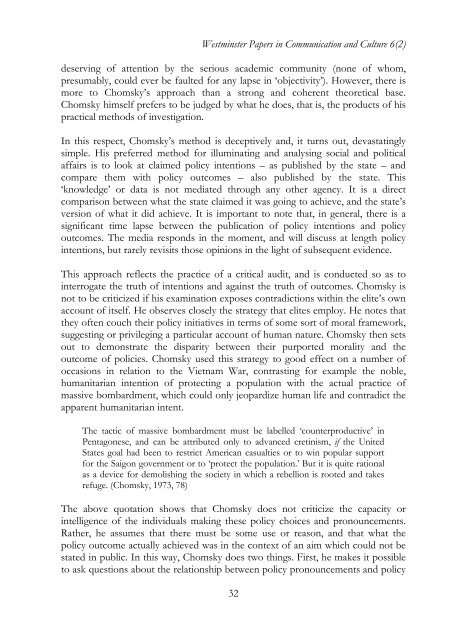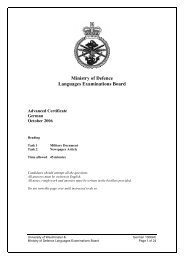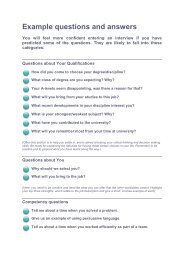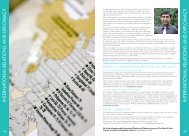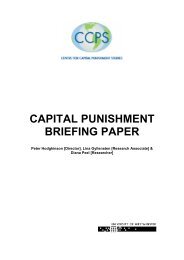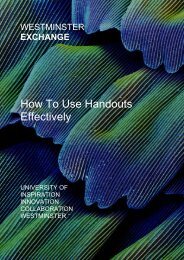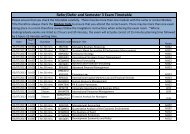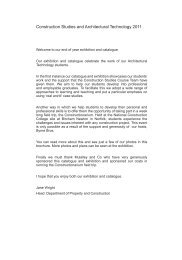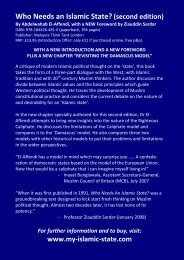Social Science, Rhetoric and Chomsky's Critique - Alison Edgley
Social Science, Rhetoric and Chomsky's Critique - Alison Edgley
Social Science, Rhetoric and Chomsky's Critique - Alison Edgley
Create successful ePaper yourself
Turn your PDF publications into a flip-book with our unique Google optimized e-Paper software.
Westminster Papers in Communication <strong>and</strong> Culture 6(2)deserving of attention by the serious academic community (none of whom,presumably, could ever be faulted for any lapse in ‘objectivity’). However, there ismore to Chomsky’s approach than a strong <strong>and</strong> coherent theoretical base.Chomsky himself prefers to be judged by what he does, that is, the products of hispractical methods of investigation.In this respect, Chomsky’s method is deceptively <strong>and</strong>, it turns out, devastatinglysimple. His preferred method for illuminating <strong>and</strong> analysing social <strong>and</strong> politicalaffairs is to look at claimed policy intentions – as published by the state – <strong>and</strong>compare them with policy outcomes – also published by the state. This‘knowledge’ or data is not mediated through any other agency. It is a directcomparison between what the state claimed it was going to achieve, <strong>and</strong> the state’sversion of what it did achieve. It is important to note that, in general, there is asignificant time lapse between the publication of policy intentions <strong>and</strong> policyoutcomes. The media responds in the moment, <strong>and</strong> will discuss at length policyintentions, but rarely revisits those opinions in the light of subsequent evidence.This approach reflects the practice of a critical audit, <strong>and</strong> is conducted so as tointerrogate the truth of intentions <strong>and</strong> against the truth of outcomes. Chomsky isnot to be criticized if his examination exposes contradictions within the elite’s ownaccount of itself. He observes closely the strategy that elites employ. He notes thatthey often couch their policy initiatives in terms of some sort of moral framework,suggesting or privileging a particular account of human nature. Chomsky then setsout to demonstrate the disparity between their purported morality <strong>and</strong> theoutcome of policies. Chomsky used this strategy to good effect on a number ofoccasions in relation to the Vietnam War, contrasting for example the noble,humanitarian intention of protecting a population with the actual practice ofmassive bombardment, which could only jeopardize human life <strong>and</strong> contradict theapparent humanitarian intent.The tactic of massive bombardment must be labelled ‘counterproductive’ inPentagonese, <strong>and</strong> can be attributed only to advanced cretinism, if the UnitedStates goal had been to restrict American casualties or to win popular supportfor the Saigon government or to ‘protect the population.’ But it is quite rationalas a device for demolishing the society in which a rebellion is rooted <strong>and</strong> takesrefuge. (Chomsky, 1973, 78)The above quotation shows that Chomsky does not criticize the capacity orintelligence of the individuals making these policy choices <strong>and</strong> pronouncements.Rather, he assumes that there must be some use or reason, <strong>and</strong> that what thepolicy outcome actually achieved was in the context of an aim which could not bestated in public. In this way, Chomsky does two things. First, he makes it possibleto ask questions about the relationship between policy pronouncements <strong>and</strong> policy32


